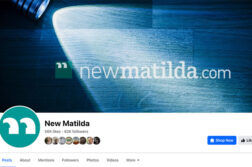Last week Annabel Crabb delivered the A.N. Smith Lecture in Journalism at the University of Melbourne. Crabb tackles the tricky question of how to convince audiences to pay for content and considers the market proposition that is journalism. Her account of the costs of journalism is worth citing at length:
"When you buy the work of a journalist, you are buying the time and the research and the writing.
"But there’s more than that. You’re buying a fraction of the ten hours that that journo spent hanging around on the night that Kevin Rudd was knocked over, talking to people when you were asleep.
"You are taking out a time share on all the stuff that journo remembers, an infinitesimal slice of the mistakes they’ve made, and what they learned. You are buying a tiny shred of the moment when Laurie Oakes got leaked the whole Budget, or a millionth of a sesame seed on the bread roll of the lunch that Laurie deserted on the day of the Whitlam dismissal, to sprint back to Old Parliament House.
"You are compensating that journo, to a tiny degree, for the ten-minute bollocking she just copped from Paul Keating. Or Malcolm Turnbull. Or the CEO of some company. And in the case of the very best and most fearless journos, you are insuring them against the fact that they will never work in this town again.
"I can understand the argument that information, in an ideal world, should be free. But I’m also familiar with free information. Free information is usually free for a reason. Mostly, it’s free because it’s a press release, or an ad, or it’s been nicked from TMZ.com, or because it’s so incredibly banal that even its creator can’t bear to look you in the eye and shake you down for cash. Free information, ladies and gentlemen, tends to be crappy information."
We don’t have a dedicated hack stationed at Parliament House ready to front up for a scolding from parliamentary redoubtables like Christopher Pyne or Martin Ferguson — although one day we plan to. What we do have is a cohort of expert writers around the country chasing leads, making calls, shaking hands, doing interviews, thrashing out ideas and doing research. It might all look easy and glamorous, but it ain’t. And honestly, if we had a dollar (OK, a hundred dollars) for every time a web guru told us the only way to make money online was to stop paying writers and editors, we wouldn’t have to launch a fundraising appeal at all.
Obviously, there’s particular resonance to Crabb’s eloquent account of the price of journalism in the New Matilda office. We’re still fundraising and we will be doing so until the end of the year. We’re thrilled at the response we’ve already received to our FundBreak campaign (go here and click SUPPORT PROJECT to become a New Matilda supporter) but we’ve got a long way to go yet.
If you haven’t yet signed up, please consider doing so. We’ll happily accept any donations but the standard rate to become a New Matilda supporter is $80 a year. That’s less than ten bucks a month! We’ve just cracked 20 per cent of our fundraising target — which means that if everybody who has already signed up brings four friends on board, we’re all set!
We’ve got double passes to Fair Game, a movie about CIA agent Valerie Plame, for those who get in early. If you missed out on the movie tickets first time around, send us an email with "Fair Game" in the subject line and your address on enquiries AT newmatilda.com.
Crabb offers this rule of thumb for paid content: "If you’re already doing it, don’t charge for it. If it’s something new, make it worth charging for." We’re going to have a bet each way. We’ve built our reputation on sharp, independent commentary and even though we’re already doing it, we’re not going to stop. We’ve also got plans for new content types in the new year — like experiments with data journalism and information graphics. Look out for some great new multimedia content on the site from some of our farflung correspondents over the next few weeks. We won’t, however, be hiding our wares behind a paywall. NM content will be available to anybody who visits the site — and we’re hoping that sufficient numbers of you will see the value in it and support the site.
If you recall, it was Crabb’s boss, Mark Scott, who delivered the A.N. Smith lecture (pdf) in 2009. A year ago, Scott acknowledged that even major outlets like the ABC were struggling to come to terms with the transformation of the media business, referring to "the inability to find any major, traditional media organisation who you could confidently say has got it right in this world of fragmenting content and audiences."
Not much has changed in 12 months but not long after Scott’s lecture, the ABC launched The Drum, its online portal for commentary and analysis. 2009 also saw the rollout of the National Times by Fairfax and The Punch by News Ltd. The major outlets might not be sure how to get it right, but they’re giving it a red hot go — competing with smaller sites for audiences and for contributors.
With Scott’s blessing and budget, The Drum entered the scene with a number of star recruits, including Annabel Crabb, but some of these, including New Matilda’s Ben Pobjie and Fiona Katauskas, have recently been let go. Jonathan Green, editor of The Drum, told New Matilda that there had been no budget cuts, just a budget "tightness".
Elsewhere, independent online outlets struggle. On Line Opinion, a veteran of Australian online media which has been publishing for 11 years, recently announced that it will be exploring new ways of revenue raising in order to sustain the business. The challenges that editor Graham Young describes here are all too familiar to us at New Matilda. Similarly, Inside Story, which has been online for two years, also launched an appeal for donations via its website and email list last month.
It’s no easier in the world of print. Australia’s most famous literary quarterly, Meanjin, looks set to only publish online — and that with the support of a major university press.
There are some things haven’t changed about the media: there’s plenty of gossip flying about, that’s for sure. Paywalling here. Business strife there. Budget cuts all over. It all makes it pretty hard to predict what the Australian media landscape will look like this time next year, especially online. Your contribution will help New Matilda stay on the scene throughout 2011. We’ll keep offering new perspectives on familiar stories and we’ll going to keep looking for new information to add to public debate. And in the one week of the year where a horse race is the lead national news story, we’re convinced that this is a worthwhile objective.
Donate To New Matilda
New Matilda is a small, independent media outlet. We survive through reader contributions, and never losing a lawsuit. If you got something from this article, giving something back helps us to continue speaking truth to power. Every little bit counts.



